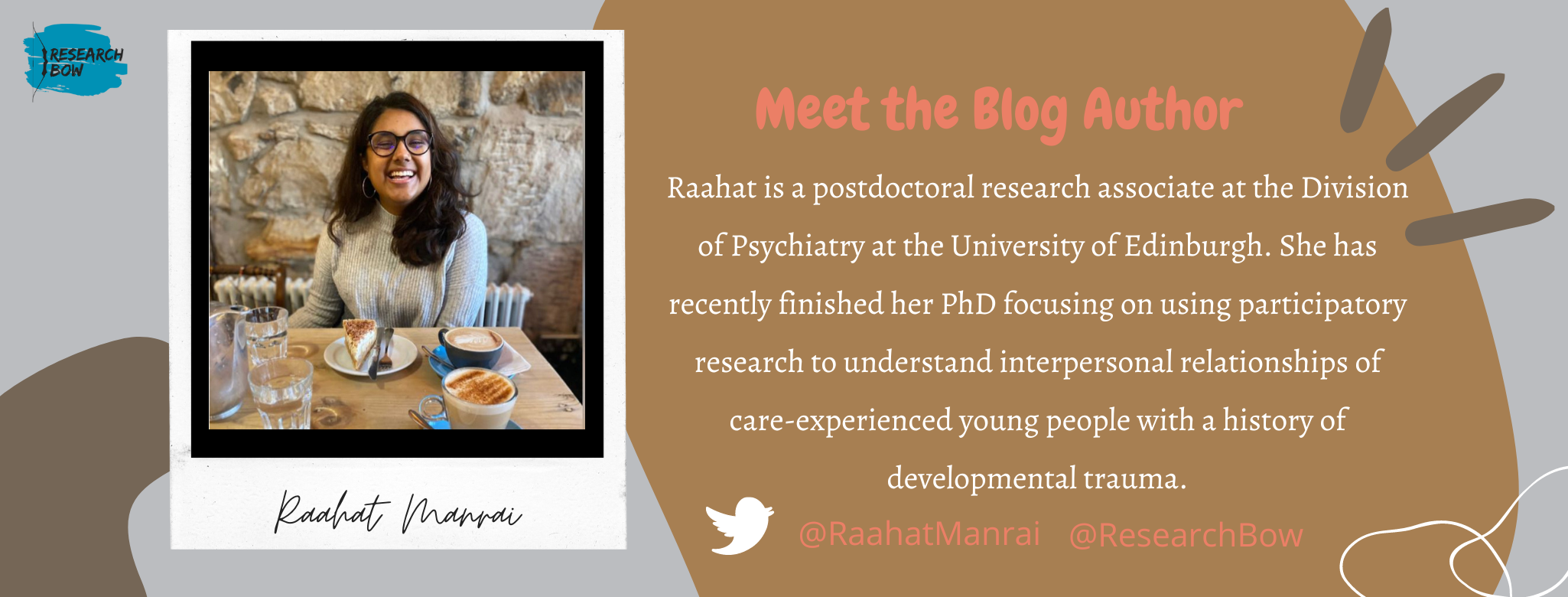We love hearing about the post-PhD careers of the PGRs of the School of Health in Social Science. So it’s time to celebrate the diversity of post-PhD careers and inspire our current PGRs. Join us as we move to the third part* of our blog series, Hello from the Other Side – Alumni Series, with an interview with Raahat Manrai.
What programme did you complete and in what year?
PhD in Clinical Psychology, January 2024.
What are you doing now? (Job, role, etc.) Where are you based?
I am currently working as a postdoctoral research associate for the AMBIENT-BD project based in the Division of Psychiatry at the University of Edinburgh. As my role is primarily on campus, I am based in Edinburgh.
What drew you to that role? Was this part of your initial plan?
I always wanted to be an academic, which is what drew me to doing a PhD in the first place. I started applying for potential post doctoral positions almost 3-4 months in my fourth year (write-up year). I applied for this particular role because it utilised the same research methodology as my PhD. I wanted to work with a different set of people and expand on my knowledge and ‘expertise’ of using participatory action research in different vulnerable population groups, hence, this position was appropriate for me given my current set of skills.
What specific knowledge or skills do you feel best prepared you for your post-PhD career?
Following on from the previous answer, my current project focuses on the same research methodology as my PhD. During my PhD, I gained valuable experience of working with third sector organisations and conducting qualitative research (especially co-production) which qualified me for my current role.
I was also a part of smaller initiatives that helped me develop my skills like organising events, writing small grant applications and working with different stakeholders which added to my advantage of applying for several academic positions. I was offered interviews for several positions based on my PhD research but also on the experience gained as a part of my extra curriculars.
What have been the most unexpected challenges you’ve faced in your career since completing your PhD?
I am quite recent in my current role but I believe the biggest challenge is the transition from a PhD to a Postdoc. I am still getting used to being part of a big team and delegating responsibility to other members. I believe doing a PhD at times means making all executive decisions by oneself and I am learning how to balance working independently and as part of a team.
I would also like to advise people who are looking for academic positions to start looking for jobs before submitting. I recognise that is easier said than done but certain funding deadlines and academic positions are advertised earlier so it is helpful to be ahead of the curve. I would also encourage to look up eminent people in your research area and contact them in order to be visible in case they have any opportunities available.
On the flip side, what are the most rewarding aspects of your career after PhD?
I would definitely say that working as part of a team means that I do not have to carry out all the activities by myself. There are people to help out in case of any difficulties and it is easier to maintain a work-life balance. Also, being paid is a definite perk!
What advice would you give to PhD students who are preparing for their post-PhD life?
Start early and be proactive! Especially if you are looking for an academic career. It is important to remember that we gain innumerable skills during our PhD journey, so don’t undersell yourself when you are applying for jobs.
Is there anything else you would like to share about your life after PhD?
It takes a while to adjust to a post-PhD life, no matter where you are. Be kind to yourself as you might experience some withdrawal symptoms once you have submitted since a PhD consumes almost 4-5 years of your life. Take some time off and develop some community support to help you in a strange post-PhD time!

*Make sure to check the rest of the interviews in the Hello from the Other Side – Alumni Series here.




